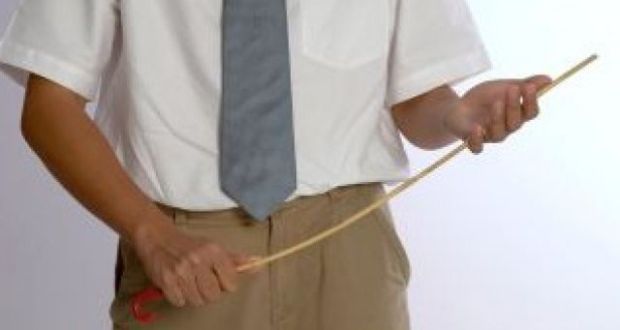Teachers must discipline students with caution
Last week, Hauwa’u Salihu, a Senior Secondary School (SS2) student of Rochas Foundation School, Zaria, was hospitalised at the Ahmadu Bello University Teaching Hospital (ABUTH), Shika, Zaria, for serious injuries to the back of her neck and spinal cord following severe punishment by her mathematics teacher, Isa Mohammed. After undergoing MRI and city scan X-rays […]

Last week, Hauwa’u Salihu, a Senior Secondary School (SS2) student of Rochas Foundation School, Zaria, was hospitalised at the Ahmadu Bello University Teaching Hospital (ABUTH), Shika, Zaria, for serious injuries to the back of her neck and spinal cord following severe punishment by her mathematics teacher, Isa Mohammed.
After undergoing MRI and city scan X-rays and other treatments, Hauwa’u has been discharged and is now undergoing physiotherapy.
- Bandits kill 6 in Taraba, Katsina, abduct 36 in Kaduna
- Terrorists plotting to attack Lagos, FCT, Kogi, Katsina, Kaduna, Zamfara – NSCDC
According to her: “When our mathematics teacher, Mr Isah, came into our class, he wrote on the board and instructed that we should not copy till after he explained. Unfortunately, I and my friend started to copy the notes while he was explaining and he spotted us. He picked a stick which was kept by our night guards and flogged us with it.
“My friend tried to protect herself with her hands thereby sustaing severe injuries on the hands. While I was trying to dodge the beating, he hit me at the back of my neck. It was after I returned home that I became so pained and my mother had to take me to a clinic.
“As days passed, the pain continued to increase, with my legs and hands going numb that I could hardly move them. I was referred to ABUTH where I was diagnosed with a fracture in the neck and that my spinal cord was nearly damaged.”
Hauwa’u’s father, Mallam Dan Ali, said he spent over N1m on the treatment of his daughter and that the treatment was ongoing.
Hauwa’u’s case is not the first of the frightening trend, whereby teachers maltreat pupils/students entrusted in their care.
In the early hours of February 12, 2022, a 17-month-old, Obinna Ohanazoeze, died at the Federal Medical Centre (FMC), Asaba, Delta State, from alleged brutalisation by his teacher, the son of the Proprietress of Arise and Shine School, Asaba, which is now sealed.
A week earlier, a two-year-old was brutally punished by a teacher, leading to multiple lacerations on his body.
There was also the death of a 13-year-old boy, Nuhu Yahya, at the Federal Government College (FGC), Kwali, Kwali Area Council of the FTC. He was allegedly hit by his teacher for not answering questions properly.
It was such that in May, 2020, the Lagos State Commissioner for Education, Mrs Folashade Adefisayo, announced that, “There is a policy in Lagos State prohibiting teachers from inflicting corporal punishment on students and pupils.”
Generally, corporal punishment used to be part of everyday life, as children were flogged, slapped, spanked, punched or kicked in response to unacceptable behaviour and/or inappropriate language. But these were administered by benevolent teachers. It’s not against the law, as Article 295 of the Criminal Code (South), Article 55 of the Penal Code (North) and the Shari’a Penal Code in the Northern states confirm the right of parents and teachers to use force to “correct” their children.
This is in line with the generally accepted principle that “whoever spares the rod spoils the child” and “the one who loves their children is careful to discipline them.”
But with the recent upsurge in teachers’ brutality, alternative forms of discipline, including extra homework, loss of recess time and other privileges, should be pursued.
Both parents and teachers should work earnestly on proper guidance by setting rules, limits and following through with consequences and holding children accountable for their behaviour.
Also, corporal punishment in all schools should be regulated and the forms acceptable should be made clear to all teachers so that they don’t become nightmares to parents and children.
No blow or force that causes wound or grievous harm can be justified under any circumstance as a form of correction. After all, Article 295 (6) of the Criminal Code (South)reads: “No correction can be justified which is unreasonable in kind or in degree, regard being had to the age and physical and mental condition of the person on who it is inflicted; and no correction can be justified in the case of a person who, by reasons of tender years or otherwise, is incapable of understanding the purpose for which it is inflicted.”
So, government must ensure that only trained and qualified teachers are employed in public and private schools. This will automatically remove the recruitment of immature teachers who wreak havoc on the psyche of the children.
In addition, there should be an enabling environment for teachers and their welfare to be taken seriously so that they do not vent their frustrations on students.
The risk of the current wave of brutal punishments is that children develop “thick skin” and in extreme cases become withdrawn from their peers and are demotivated to attend school. There must be other ways of halting an offence, preventing recurrence and setting example for others without scaring pupils and students away from school; a disincentive to education.
